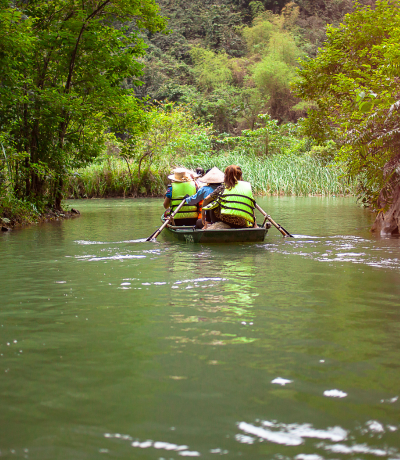Are you ready to try ecotourism?
19 January 2024
Who could say no to spending their vacation in the clean open air, surrounded by beautiful scenes of nature, away from the noise and pollution of city life? Websites advertising ecotourism tout the benefits of unplugging, recharging, and spending time learning about new cultures and traditions.
What’s not to like?
Well, depending on your personal tastes and resilience, an ecotourism trip could also mean less privacy, plenty of bugs, and only occasional showers.
Let’s dive into the topic of ecotourism and see if you’re ready to try it.

What is ecotourism anyway?
Ecotourism began as a movement in the 1980s, and the definition entered the dictionary in 1982:

According to David Fennell, the editor-in-chief of the Journal of Ecotourism, just visiting a national park doesn’t mean you’re on an ecotourism trip. It’s about a little more than just yourself as a tourist.
These days, in addition to the concept of minimal impact, the idea of reciprocity – giving back to the site you are visiting – has been added. Ecotourism also has an educational component to it. It’s meant to teach about nature, culture, and regional threats to both in the area you are visiting.
As ecotourism and sustainability have become a hot topic in the travel industry, the posers have multiplied and a new term has emerged: greenwashing. Greenwashing is a term applied to the practice of promoting environmentalism as a ploy rather than a reality.
What are the pros and cons of ecotourism?
Ecotravelers believe that ecotourism is important for taking care of one’s own health and also for protecting and caring for the natural environment.
The benefits of ecotourism are:
- Increased knowledge of nature
- The opportunity to assist nature in active conservation and/or restoration
- Increased regional literacy and an understanding of local traditions
- Employment for local residents
Some of the disadvantages of ecotourism are:
- Fewer comforts like hot water or luxurious meals
- Interactions with wild animals that are unaccustomed to humans
- Lack of privacy in some cases
- Potentials safety and accessibility issues
So, let’s say you want to try ecotourism. What do you need to watch out for?
How do you spot greenwashing when you travel?
As you might imagine, greenwashing is full of nuance that can trick even experienced travelers. Here’s how you can sidestep ecotourism scams:
- Be curious and do your research – is the site actively treating animals, for example, humanely? So-called elephant sanctuaries in Thailand are advertised as a ‘refuge for gentle giants’ but actually treat the animals with extreme cruelty.
- Verify opinions – making sure that the reviews aren’t written by professional marketing teams. You can often spot these by noticing reviews are consistently polished and well-written. Be very skeptical of influencers too! Picture perfect shots of beautiful places without any reference to local traditions or concerns is a red flag.
- Ask specific questions – depending on where you are going and what type of trip you want to take, ask very specific, even tough and direct questions.
How to get started with ecotourism
The nice thing is you don’t have to jump off the deep end into ecotourism. There are many ways you can incorporate elements of responsible travel into your travel plans:
- Dine at local farm-to-table restaurants and buy your food at local farmer’s markets
- Balance nights in luxury accommodations with star-lit glamping
- Skip renting a car and rent a bike instead – or take a train instead of short-haul flights
You can also stay at an eco-lodge—look for:
- Sustainable practices like renewable energy, support for local communities, and minimal waste.
- Certifications by recognized organizations like the Global Sustainable Tourism Council or Rainforest Alliance.
Genuine ecolodges are committed to supporting and engaging with the local community, like using local suppliers and employing local staff. They are also transparent about their eco-friendly initiatives and able to show information that confirms their efforts.
Related topics
Damian Tysdal is the founder of CoverTrip, and is a licensed agent for travel insurance (MA 1883287). He believes travel insurance should be easier to understand, and started the first travel insurance blog in 2006.
